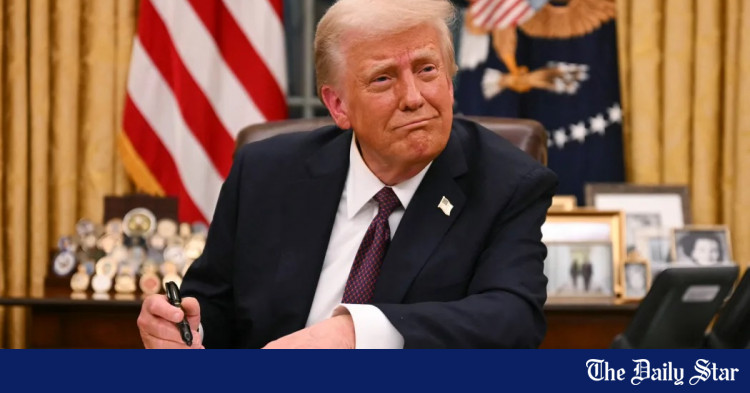- Copy to clipboard
- Thread starter
- #46

Trump’s return raises cautious optimism
Govt, businesses should take proactive measures in light of the new reality
Trump’s return raises cautious optimism
Govt, businesses should take proactive measures in light of the new reality

VISUAL: STAR
Donald J. Trump's second term as US president is expected to bring significant changes to the world's political and economic order, as reflected in his inaugural speech and the executive orders he signed on Monday. We look ahead to the next four years with cautious optimism, given the unpredictability of his actions during his first term in office (2017-2021).
Trump's re-election to the top seat of a superpower and the continued rise of the ultra-right in the US sends a strong message. It signals a shift in America's view of the world and its international commitment to uphold human rights and promote peace and stability. As before, Trump's America-first policies may significantly impact international affairs where belligerent competitiveness may outweigh reason and compromise. On the other hand, there is hope that Trump, who took credit for brokering the ceasefire deal between Israel and Hamas, may influence an end to the Russia-Ukraine war as well—two biggest international crises in recent years. We, however, hope that his recent scepticism about this ceasefire will not result in another unfair deal for Palestinians, who have already suffered decades of repression by Israel with the support of the US's one-sided policy.
Sadly, America's own track record of human rights violations does not inspire confidence. Trump's pardoning of 1,500 rioters involved in the 2021 Capitol Hill attack signals the supremacy of personal loyalty over the rule of law. What does this act say about the US stance on justice and fairness—values it prescribes to other countries? Moreover, Trump's pledge to launch a "tariff war," his idea of a universal tariff on all foreign goods, and his withdrawal from the Paris Climate Accord and the World Health Organization are quite concerning, especially for countries like Bangladesh. However, the recent meeting between the new Chargé d'Affaires of the US Embassy and Chief Adviser Muhammad Yunus has left room for hope as the former renewed the pledge to support the interim government on issues including development.
In the meantime, the business community and the government should take proactive measures such as exploring and diversifying markets and products, engaging in diplomatic initiatives, and strengthening regional and bilateral ties with other nations. The government should also engage with the Bangladeshi expatriate community in the US to build a stronger relationship with the Trump administration.
Finally, the prominent presence of tech giants at Trump's inaugural ceremony should be taken seriously. The re-emergence of an ultra-nationalist leader could have serious consequences for the world, particularly in a nuclear and tech-driven era. This is especially alarming for smaller nations like ours. We can only hope that the superpowers will see the bigger picture and that good sense will prevail in building a cooperative world.
Govt, businesses should take proactive measures in light of the new reality
VISUAL: STAR
Donald J. Trump's second term as US president is expected to bring significant changes to the world's political and economic order, as reflected in his inaugural speech and the executive orders he signed on Monday. We look ahead to the next four years with cautious optimism, given the unpredictability of his actions during his first term in office (2017-2021).
Trump's re-election to the top seat of a superpower and the continued rise of the ultra-right in the US sends a strong message. It signals a shift in America's view of the world and its international commitment to uphold human rights and promote peace and stability. As before, Trump's America-first policies may significantly impact international affairs where belligerent competitiveness may outweigh reason and compromise. On the other hand, there is hope that Trump, who took credit for brokering the ceasefire deal between Israel and Hamas, may influence an end to the Russia-Ukraine war as well—two biggest international crises in recent years. We, however, hope that his recent scepticism about this ceasefire will not result in another unfair deal for Palestinians, who have already suffered decades of repression by Israel with the support of the US's one-sided policy.
Sadly, America's own track record of human rights violations does not inspire confidence. Trump's pardoning of 1,500 rioters involved in the 2021 Capitol Hill attack signals the supremacy of personal loyalty over the rule of law. What does this act say about the US stance on justice and fairness—values it prescribes to other countries? Moreover, Trump's pledge to launch a "tariff war," his idea of a universal tariff on all foreign goods, and his withdrawal from the Paris Climate Accord and the World Health Organization are quite concerning, especially for countries like Bangladesh. However, the recent meeting between the new Chargé d'Affaires of the US Embassy and Chief Adviser Muhammad Yunus has left room for hope as the former renewed the pledge to support the interim government on issues including development.
In the meantime, the business community and the government should take proactive measures such as exploring and diversifying markets and products, engaging in diplomatic initiatives, and strengthening regional and bilateral ties with other nations. The government should also engage with the Bangladeshi expatriate community in the US to build a stronger relationship with the Trump administration.
Finally, the prominent presence of tech giants at Trump's inaugural ceremony should be taken seriously. The re-emergence of an ultra-nationalist leader could have serious consequences for the world, particularly in a nuclear and tech-driven era. This is especially alarming for smaller nations like ours. We can only hope that the superpowers will see the bigger picture and that good sense will prevail in building a cooperative world.








